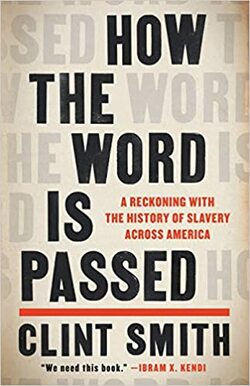 I've spent the last 4 months either in a reading lull or starting and not finishing several books. I finally picked up How The Word Is Passed by Clint Smith and really liked it. This was another Ryan Holiday recommendation. I learned a lot from this book and was shocked by how much of the history related to slavery and racism I didn't know. I like how the chapters are separated by historical areas Smith visits. He tells a beautiful story with eye opening historical details, revealing the past and also how these sites operate today. Forget about all the controversy about CRT, just read this book if you want to learn more about the history of slavery. 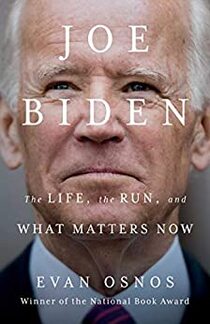 I picked up Joe Biden: The Life, the Run, and What Matters Now by Evan Osnos as I admittedly didn't know much about President Biden and wanted to learn more. I appreciated Osnos' writing style and that he did a pretty good job revealing many sides of Biden. What I liked most about this book was that it helped me understand how Biden got to where he is, I liked having the background. I also now have a better understanding of what Biden will do as President. It was worth the quick read. 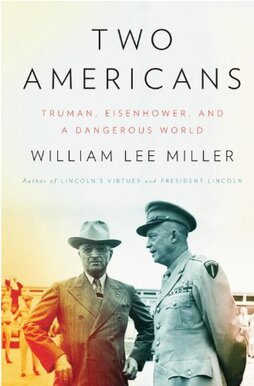 After I read Leadership in Turbulent Times I was interested in reading about some of U.S. history after Franklin Roosevelt, so picked up Two Americans: Truman, Eisenhower, and a Dangerous World by William Lee Miller. This was well written and an interesting look at both the positive and the faults of two presidents, Harry Truman and Dwight Eisenhower. I appreciated how Miller dissected many events and aspects of these two men, provided various viewpoints and didn't just glorify each of them but dove into the negative and gave some counterarguments. The two were born six years apart and Eisenhower followed Truman in office. They were the first presidents faced with the power of nuclear weapons. Miller dove into topics such as bombs, wars, racism and assessed the success of each of these two-term presidencies. Before reading this I didn't know much about these two presidents, so I learned a lot and liked how Miller not only made the text easy to read, but also broke down the topics so that you got a full 360 view. Some parts were hard for me to get through since I don't read a lot of history, but I'm glad I made it through this one. 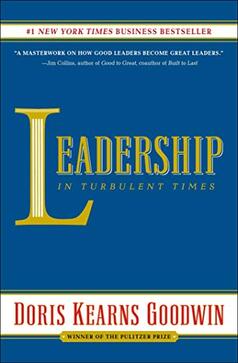 Ryan Holiday suggested Leadership in Turbulent Times by Doris Kearns Goodwin as a timely read during this pandemic. It was interesting to read about the leadership of past presidents during unprecedented times. Goodwin was also able to put together a historical book that was actually interesting to read (dare I say gripping) and relatively easy to get through. Goodwin examined the early years, rise to presidency and the exercise of leadership of Abraham Lincoln, Theodore Roosevelt, Franklin D. Roosevelt, and Lyndon B. Johnson. I really enjoyed learning more about how these presidents handled some dire situations in America's past. For Lincoln it was the Civil War and Emancipation Proclamation; Teddy Roosevelt and the Coal Strike of 1902; Franklin Roosevelt and the Great Depression; and Johnson and the Civil Rights Movement, specifically the Civil Rights Act of 1964 and Voting Rights act of 1965. Goodwin combines biographical details with historical context and adds in keen insights about leadership throughout the book. I thought it was interesting how she included President Johnson in the book. She explicitly pointed out how Johnson's time in office and as a leader was overshadowed by the catastrophe that was the Vietnam War and the mistakes that were made by the President and administration. However, she feels as though his work on pushing through the Civil and Voting Rights acts was worth detailing, as without Johnson's political, persuasion and leadership skills, Civil Rights legislation might have remained stuck in Congress for many more years. It was also interesting reading about the years leading up to Johnson's death in the epilogue, part of which she spent by Johnson's side. This really was an amazing book about history, what true leadership can look like, overcoming adversity, and how America has survived some of its hardest times. 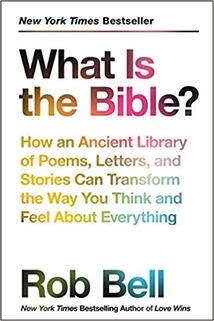 After I read Love Wins by Rob Bell I had to read another one of his books so picked up What Is the Bible. Bell brings to this book more perspective about the Bible and Christianity that I wish I knew about sooner. But as Bell says, it's never too late to change and develop knew thoughts and beliefs, and something as big as spirituality and historic and religious texts should be constantly wrestled with and questioned with the goal always being personal growth and improvement of the earth. Rob makes a strong argument for why and how we should look at the Bible in a new way and why it's still relevant and helpful in today's world. One of the key points Bell makes is that the Bible was not created by God, it was created by humans, and you cannot get to the holy without going through the human first. So you have to understand the humans that wrote the book, and its historical context. Therefore, it's pointless to argue whether the Bible is true or not or whether or not it's the word of God and needs to be followed exactly as written. Yes, people in the Bible quote God and say things are the word of God, but that was their perspective of God in their time.. The Bible was written by real people, in a real world at a point in time in history when real (and terrible) things were happening to them. When we take that into consideration as we read the Bible, we can start to understand it better and actually allow it to be useful to us for growth. We must ask ourselves, why did these people decide to keep this story alive (at a time when there was no printing press)? What where they trying to get across and could they perhaps be using language and innuendo and humor in strategic ways to be sure this message gets across in the right way and creates change? I loved this fresh perspective on the Bible and think this is a must read even for those who are not religious or don't believe in God. The Bible is a historical document. It was refreshing learning more about it from this perspective. 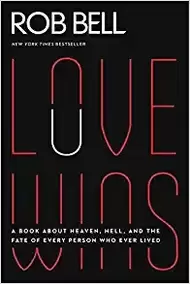 I picked up Love Wins: A Book About Heaven, Hell and the Fate of Every Person Who Ever Lived by Rob Bell after Pete Holmes recommended it in his book Comedy Sex God as well as Ryan Holiday in his books to read newsletter. This was a great follow up to the insightful and pleasantly surprising commentary about God and the meaning of life from comedian Pete Holmes. Bell gives a refreshing take on Jesus's story that I've been waiting to hear. Here's a Christian Pastor who's saying, 'yea, some people just are looking at this the wrong way.' He starts by acknowledging the staggering number of us who have been taught that a select few Christians will spend forever in a peaceful, joyous place called heaven while the rest of those who did not accept Christ into their heart will burn in hell forever. Bell says this is misguided and a toxic way to spread the word of God and Christianity. Instead, Bell hopes to spread a contextualized version of the story that focuses on spreading Jesus's message of love, peace, forgiveness and joy that our world desperately needs to hear. This book is about the meaning of life and why we should be good people - now. His take is that people can find peace and "heaven" and "eternal life" here and now, and alternatively have the chance and choice to live in hell on earth - now. Bell dives into how and when the Bible mentions the word heaven and hell (a surprisingly few number of times), what the context is around it, how the Hebrew words got translated and what the original words meant to the people at that point in time. It's a quick read and if you haven't read Rob Bell, I'd recommend reading this. 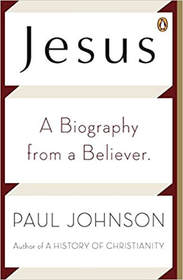 Jesus: A Biography from a Believer by Paul Johnson was a quick read and I thought a perfect written record of Jesus's life (as we know it from historical documents), from beginning to end. This was a nice refresher of the history of Jesus's life and his teachings without diving into the complexity of the Bible. This book could be used as a precursor to reading the Bible (or the Gospels) to give you more context going in. I thought the author did a good job trying his best to keep things historically accurate, but it's clear that this book comes from a Christian perspective. Christian or not, there's no doubt that the history and teachings of Jesus stand the test of time, and are important to learn from a historical perspective. As Johnson points out, as you read about Palestine in the first century AD, you notice a world that in many ways is familiar to ours today. |
AboutLiteracy is a prerequisite for freedom. Read deeply. Read what matters. Build a reading list. Don't take literacy for granted. Categories
All
|